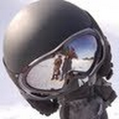Some time in the 2000s I remember stumbling on a lengthy set of Reddit posts asking "what if a force of modern US Marines found themselves stranded in Ancient Rome?". Much of this book is that, but for the zombie apocalypse. If you enjoyed that Reddit series then you'll probably enjoy this in the same way.
At other points in this fictional "oral history" I found myself thinking fondly of the late Studs Terkel's engrossing (real) oral history book Hard Times. I noticed Studs was thanked in the Afterword (along with George Romero, obvs). Hard Times is a classic because it captures different overlapping experiences of the Great Depression in people's own words, recorded by the author with dignity and respect. I think Max Brooks aimed for a fictional form of this, but missed the heart and soul of it - overlapping accounts of the same experience told by real, ordinary, people. Most of the "interviewees" in this book are generals, war heroes, profiteers, etc - the "ordinary" people are mostly still military or paramilitary.
The book tries to bring a global perspective by including accounts from around the world, but I felt Brooks strained when writing about cultures he doesn't know well. He seemed to fall back on superficial stereotypes (the Japan bits especially, eesh). He appears most at home writing American frontline troops "Gettin' the job done despite those clowns sitting behind a desk in the government", etc, etc. Definitely still cliche, but at least you get the impression he's owning it.
The other limitation of criss-crossing accounts all over the world is that there's little room for character development. A shame, because there are bits of interesting world-building throughout World War Z that you could build a great story around. For example, the refugee floating settlement in the Pacific. This shows up for a half-dozen pages, but I would have happily read a whole story set there and describing the daily lives and experiences of inhabitants. Instead, the book quickly pivots to the next section...
(Maybe I'm taking a book about a global war against zombies too seriously here, but the book takes itself seriously as well so it seems fair.)
Reading this 18 years after it was published did provide one piece of interesting perspective. In the story, the US originally denied and downplayed the outbreak leading to confusion, misinformation, and mismanagement. This account probably came over provocative and edgy in 2006, but compared against the actual events of 2020 it seems understated if anything.
World War Z is not terrible, despite all my complaints I finished reading it. And I can certainly see that there are people who would really enjoy it.
(World War Z was this month's book at my book club.)


